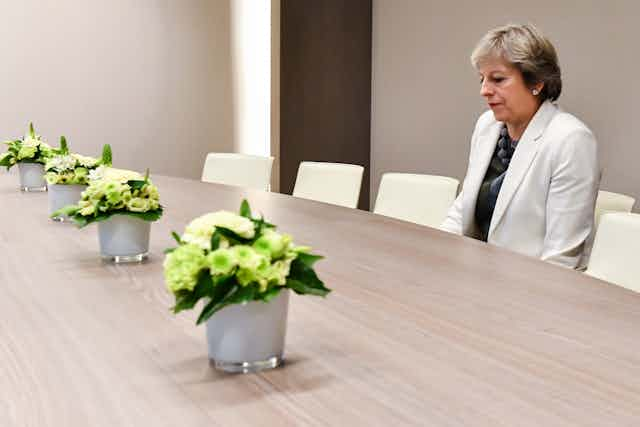In politics, it is a truism events can shift, and shift quickly. What a difference a day makes, let alone a week, a month, a year. In 2017, the year following the UK’s vote to leave the European Union, there seems to have been so many shifts: so many fundamentals have been up for discussion, so much has been at stake.
And yet, it also seems so little has changed. The UK’s entire political, social and economic system remains frozen in the seizure-like grip of the national paroxysm that is Brexit.
Looking back, it’s easy to discern the one, central reason for the freeze: this year, for better or worse, has been Theresa May’s year. Every decision the prime minister and her team have made has further entrenched the divisions wrought by the referendum result, and failed to move the nation beyond them. Let’s remind ourselves of this journey.
In her Lancaster House speech in January, May reminded us that Britain had “voted to leave the European Union, and chose to embrace the world”. With these, her opening words, the tone for 2017 was set. It was either/or: embrace the EU, or embrace the world. You can’t have both.
And it was all or nothing too: you couldn’t have some of the EU – no single market, no customs union – it was in or out, completely, definitively.
In March, this same binary either/or lay behind her stage managed signing of the Article 50 letter: against a backdrop in Downing Street of a solitary union flag, the EU flag conspicuous by its absence. Of course, we now know that the cabinet had not had a single discussion about what Brexit would look like. Pure symbolism, then, underpinned the first three months of May’s year – a simplistic reduction of a frightfully complex reality to a black and white in or out of the EU.

Indeed, so simple a reduction was it that May even beguiled herself with her binary view of the world: by April, the prime minister was explaining to the nation that the country needed to go to the polls again in a snap election to give her the mandate she needed to deliver this clean break Brexit.
People and politicians who urged caution on Brexit were “playing games with Politics”, she told us; in the coming election, “every vote for the Conservatives, will make it harder for opposition politicians who want to stop me from getting the job done”.
Of course, as the true complexities of leaving the EU were already seeping out in the public realm by this stage, it was not difficult for the electorate to see through this reductionism, and May lost her already small majority.
But this did not stop the prime minister’s quest to render the difficulties of Brexit as child’s play: after the summer recess, May delivered her Florence speech, in which she talked about the “exciting times” ahead and how Brexit represented a “sovereign nation in which the British people are in control”. The referendum vote was “a statement about how they want their democracy to work”.
Form our current vantage point, it is crystal clear that this does nothing to genuinely understand the reasons for the Leave vote, nor to appreciate the incredible complexity of leaving the EU.
These were platitudes – the simplistic reduction of the complexities of international cooperation to nothing more than poppycock. And, where May led, others in her cabinet and party followed. In July, The foreign secretary suggested in parliament the EU should “go whistle” for the money it wanted for the Brexit divorce settlement. By September, David Davis, the Brexit secretary, was describing the mooted €50 billion divorce payment as “nonsense”. In November, influential Brexiteer Jacob Rees-Mogg described Mark Carney, governor of the Bank of England as an “enemy of Brexit”.
As much as these people may be characters and have their own, elevated profiles, responsibility for inspiring them to ride roughshod over such sensitive matters should be laid squarely at the feet of a leader who was doing exactly the same.
Britain deserves better
As the whole of 2017 shows, the resort to these simple, oppositional binaries, just begets more of the same: oppositional thinking begets more oppositional thinking, more uncritical dismissal of opposing views. The year ended with death threats against MPs who rebelled against May in a recent parliamentary vote on Brexit – we would do well to remember this.
And it could have been so different. It was in fact always impossible for May – or any politician – to step into post-referendum 2017 and attempt to speak clearly on the “will of the British People”. Anyone who claims to be able to do this is wrong, even if 17.4m people voted Leave. Wrong, because there were 16m other people voting for the opposite; doubly wrong because the people who cast the 1m votes that made the difference in the referendum may have reason to change their mind now or at any time in the future.
An emollient tone was needed from May – a message to the country and our European partners that she understood the complexities that produced the referendum vote and the many different reasons for why people voted like they did.
This is the message to take into 2018: whatever side one might be on the Brexit divide, let’s all admit the complexities, and demand that politicians do the same.

